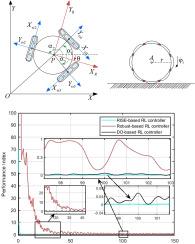Nonlinear robust integral based actor–critic reinforcement learning control for a perturbed three-wheeled mobile robot with mecanum wheels
IF 4
3区 计算机科学
Q1 COMPUTER SCIENCE, HARDWARE & ARCHITECTURE
引用次数: 0
Abstract
In this article, a novel Robust Integral of the Sign of the Error (RISE)-based Actor/Critic reinforcement learning control structure is established, which addresses the trajectory tracking control problem, optimality performance and observer effectiveness of a three mecanum wheeled mobile robot to be subject to slipping effect. The Actor–Critic Reinforcement Learning algorithm with a discount factor is introduced in integration with the Nonlinear RISE feedback term, which is designated to eliminate the dynamic uncertainties/disturbances from the affine nominal system. On the other hand, the persistence of excitation (PE) condition can be ignored due to the presence of RISE term. Stability analyses in two proposed theorems demonstrate all the signals in the closed-loop system and learning weights would be Uniformly Ultimate Boundedness (UUB) and the consideration of the system under the impact of RISE that can promote the tracking effectiveness. In conclusion, simulation results are shown in conjunction with the comparison to illustrate the powerful capability as well as the economy in control resources of the proposed algorithm.

基于行为批判强化学习的非线性鲁棒积分控制,适用于带机械轮的扰动三轮移动机器人
本文建立了一种新颖的基于误差符号稳健积分(RISE)的演员/批判强化学习控制结构,解决了受滑移效应影响的三轴轮式移动机器人的轨迹跟踪控制问题、最优性能和观测器有效性问题。将带有贴现因子的行动者批判强化学习算法与非线性 RISE 反馈项结合起来,用于消除仿射标称系统的动态不确定性/扰动。另一方面,由于 RISE 项的存在,激励持续性(PE)条件可被忽略。所提出的两个定理中的稳定性分析表明,闭环系统中的所有信号和学习权重都是均匀终极有界的(UUB),而且考虑到系统在 RISE 的影响下可以提高跟踪效果。最后,仿真结果与比较结果相结合,说明了所提算法的强大能力和控制资源的经济性。
本文章由计算机程序翻译,如有差异,请以英文原文为准。
求助全文
约1分钟内获得全文
求助全文
来源期刊

Computers & Electrical Engineering
工程技术-工程:电子与电气
CiteScore
9.20
自引率
7.00%
发文量
661
审稿时长
47 days
期刊介绍:
The impact of computers has nowhere been more revolutionary than in electrical engineering. The design, analysis, and operation of electrical and electronic systems are now dominated by computers, a transformation that has been motivated by the natural ease of interface between computers and electrical systems, and the promise of spectacular improvements in speed and efficiency.
Published since 1973, Computers & Electrical Engineering provides rapid publication of topical research into the integration of computer technology and computational techniques with electrical and electronic systems. The journal publishes papers featuring novel implementations of computers and computational techniques in areas like signal and image processing, high-performance computing, parallel processing, and communications. Special attention will be paid to papers describing innovative architectures, algorithms, and software tools.
 求助内容:
求助内容: 应助结果提醒方式:
应助结果提醒方式:


